Introduction:
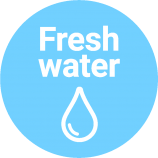
Clean drinking water and sanitation are vital elements for human well-being and environment. Even the world has advanced in providing access to safe drinking water and basic sanitation facilities, there is still long way to complete. According to the World Health Organization, handwashing is one of the most effective means to reduce the spread of pathogens and infections, including COVID-19.
Therefore, given the impotence of the subject to the countries, one of subject of the capacity-building webinars was dedicated to freshwater management indicators and polices, including SDG 6 on ensuring availability and sustainable management of water and sanitation to all.
The webinar’s agenda was to discuss the pan-European perspectives on SDG 6 regarding Sustainable Freshwater Management and Transboundary Co-operations and to exchange countries’ experiences regarding SDG target 6 “clean water and sanitation for all”. Besides, the webinar primarily discussed EEA experiences and information on freshwater management in the context of ENI East, Central Asia and Western Balkans, a global environmental monitoring system for freshwater (GEMS/Water) and GEMStat, UNECE activities in support of SDG 6 monitoring. With respect to SDG 6 ( target 6.3: by 2030, improve water quality by reducing pollution; target 6.4: by 2030, substantially increase water-use efficiency; target 6.5: by 2030, implement integrated water resources management and transboundary cooperation) Kazakhstan, Kyrgyzstan and Tajikistan presented their experiences to the meeting. Besides, transboundary basin planning in the Central Asian countries of Kyrgyzstan and Tajikistan was discussed. Armenia and Georgia also spoke about their national experiences. Transboundary monitoring in Armenia and Georgia from the European Water Initiative (EUWI+) perspective was raised. After, Austria, Bosnia & Hercegovina and North Macedonia spoke about their experiences in implementing SDG 6. Notably, Austria presented its Shared Water Information. At the end of the webinar, the participants paved the way for the next steps.
This webinar represents the following participants: European Environmental Agency (EEA), Armenia, Austria, Bosnia & Hercegovina, Environment Agency Austria, Federal Institute of Hydology Germany, German Agency for International Cooperation (GIZ), Georgia, Kazakhstan, Kyrgyzstan, North Macedonia, Regional Water and Vulnerable Environment Activity (USAID), Tajikistan, Ukraine, United Nations Environment Programme (UNEP) and Water Resource Commission Ghana.
Freshwater Management Indicators and Policies – SDG 6
Thematic Overview
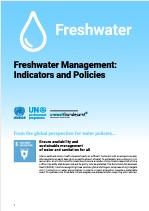
- Freshwater monitoring and data management
-
Introduction
The main purpose of water monitoring and its data management is to enable evidence based freshwater water assessments in order to characterize and assess the status of rivers, lakes and groundwater, to support the prediction of impacts and an appropriate planning for the implementation and assessment of the effectiveness of the measures. Monitoring and data management form the back ground for informing decision makers and the public, enables good planning, and supports the fulfillment of reporting obligations (SDGs, WFD reporting , INSPIRE,…). The obtained monitoring data feed the needed information exchange and their proper management result in a valuable tool for river basin management planning.
Identified Challenges
Armenia Monitoring:
- Maintenance and Modernization
- Ensure compliance with the WFD requirements
Data collection, verification, storage:
- Lack or insufficiently trained staff
- Not clear set-up of competencies
- Limited cooperation and interaction
Austria Data to be collected only once and kept where it can be maintained
most effectively
To share the data with many users and applications
To use the water data for different purposes, collect once and use more than once
To establish common interfaces, combine data from different sources harmonization of
data
To enable the information collected at one level to be shared with all levels
detailed for thorough investigations e.g. for strategic purposes
To interlink the information systems
Bosnia and Hercegovina To update and implement the updated EEA Environmental Monitoring and Reporting Data Management Strategy
Develop and implement a Data Exchange Strategy, including IPP and environmental/water statistics, which will define: the legal and organizational basis and procedures for data exchange, a common set of environmental/water indicators harmonized with international methodologies and how to provide open access to data. Develop and adopt a Plan for the implementation of the Directive on Standardized Reporting(SRDS)
Strengthen national statistical system through improved cooperation and coordination of all institutions involved in data collection, processing and dissemination.For more information, please see the presentation of Austria, Bosnia and Herzegovina.
Good Practices
Armenia and Georgia
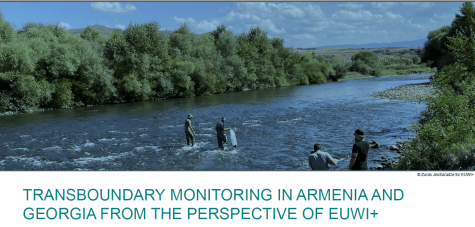
Objective of the survey in autumn 2020 was a more substantial cooperation of the Armenian and Georgian survey teams in survey preparation, exchange and comparison of survey results and joint reporting. The survey scope was to gather biological, physio-chemical and hydro morphological data from neighboring locations at the Khrami-Debeda river basin in Georgia and in Armenia. Results were then jointly discussed and compared.
Another objective of the survey was to gain more field data in order to increase the knowledge and the accuracy of the ecological status classification methodology based on macro-invertebrates. The supportive quality elements (physio-chemical and hydro-morphological parameters) help to identify human impacts and pressures. Further goals were to:
- Provide data for the evaluation of the water body delineation and the monitoring design.
- Provide lessons learned for the guidance document on transboundary monitoring.
- Improve knowledge transfer and data exchange between national experts of Armenia and Georgia.
Source: https://www.euwipluseast.eu/images/2021/03/PDF/AM-GE_JOINT_SW_Survey_Report_2020_final.pdf
Austria – Environment Agency Austria (EAA) – Project on Wastewater surveillance to detect SARS-CoV-2 virus in Austria’s population
The "Coronavirus Disease 2019" (COVID-19) has developed into a worldwide pandemic that also affects Austria. In the crisis, policy makers and authorities need reliable and comprehensive information on the incidence and prevalence of the disease. The figures serve both as a basis for decision-making and to demonstrate the effectiveness of preventive measures. The aim of the project was to complement the existing repertoire of epidemiological methods and resources (e.g., the Epidemiological Reporting System, dark count study) with wastewater epidemiology.
Within the Austrian Coron-A project, a highly sensitive, selective and reliable analytical method for the detection of SARS-CoV-2 RNA in wastewater samples was established and the aspects concerning transport, storage and sample stability were investigated. At the same time, the resources and logistics necessary for a national monitoring program were established. This included the development of standard procedures for sampling, storage and transport, as well as the establishment of interfaces with authorities. The data network with central geodatabase established in the project can collect results in real time and process them statistically, so that the output tables, maps and diagrams of the system can always be updated.
Particular strengths of wastewater analysis compared to other epidemiological methods are:
1. High temporal and spatial resolution
2. Collection of population-specific data without having to interfere with the privacy of the individual (non-invasive)
3. No consent and cooperation of the subjects necessary
4. Simple and safe sampling as part of self-monitoring of wastewater treatment plants
5. Simple logistics
6. Fast and cost-effective implementation
Link to project homepage: https://www.coron-a.at/
North Macedonia
Strengthening the participation of the Western Balkans in the work of the European Environment Agency 2020-2021: Actions for Water and Foresight assessments.
Duration: January-December 2021.
Aim:
- Support strengthening expert capacity of countries in reporting data to WISE SoE data flows and in implementing the water chapter of the National State of Environment Report (SOER)
- Via Global Megatrend (GMT) assessment, facilitate a process to incorporate or strengthen the use of participatory foresight outputs into integrated assessments and national SoE reporting.
Objectives and related activities:
- Strengthen reporting to international reporting obligations
- Support capacity building in line with the EU Sustainability Agenda, with a focus on ecosystem-based management
- Support the implementation of pilot activities tailored to national needs in the implementation of Monitoring, Data, Information, Assessment and Knowledge (MDIAK-C) chain in water quality.
- Develop an assessment method for potential implications of Global Megatrends
United Nations Environment Programme
The UNEP Global Environment Monitoring System for Freshwater (GEMS/Water)
The Global Environment Monitoring System for freshwater (GEMS/Water) provides the worldGEMS/Water logo community with sound data on freshwater quality to support scientific assessments and decision-making on the subject.
Surface and ground water quality monitoring data collected from the global GEMS/Water monitoring network is shared through the GEMStat information system.
GEMS/Water supports the Sustainable Development Goal for Water (SDG 6) with methodology support, data management, quality assurance, indicator calculation and capacity development.
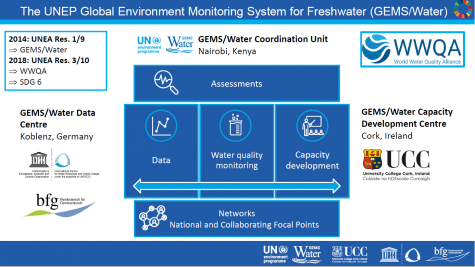
https://www.unep.org/explore-topics/water/what-we-do/monitoring-water-quality
For more information, please see the presentation of Austria, Georgia, North Macedonia and United Nations Environment Programme.
-
National/International reporting - including SDGs
-
Introduction
To track progress towards water related targets on the national and international scale reporting, including SDGs, gives the opportunity to identify achievements and distance to targets as well as providing a source to inform public policy in order to stipulate adequate reactions.
Identified Challenges
Bosnia and Herzegovina
- Bosnia and Herzegovina has not yet started to develop a national program for transposing EU NPAA regulations,
- Coordination of the process of transposition, application and implementation of EU legislation in Bosnia and Herzegovina results in incomplete/non-existent information on the adopted acquis communautaire and the inability to monitor implementation need to be strengthened.
- Fulfillment of international obligations arising from accepted international agreements on environmental protection need further support.
- Reporting of Bosnia and Herzegovina according to the requirements arising from accepted international obligations (global treaties, Council of Europe treaties, UN-ECE treaties, other international treaties) needs improvement.
- Further development of the current partial reporting to EUROSTAT and other international institutions, obligation regulated by the Law on Statistics of Bosnia and Herzegovina will take further steps to improve.
- Institutions and human resources are facing insufficient capacity to address the impact of climate change on water resources
For more information, please see the presentation of Bosnia and Herzegovina.
Good practices
United Nations Economic Commission for Europe - UNECE Reporting on SDG indicator 6.5.2 and under the Water Convention
Reporting on transboundary water cooperation: The reporting exercises on SDG Indicator 6.5.2 and under the Water Convention are unique mechanisms for assessing the state of transboundary water cooperation worldwide. Countries sharing transboundary waters submit national reports every 3 years. Country reports provide information for the calculation of the national SDG indicator 6.5.2 values; they also offer a wealth of other important information on water management practices in transboundary basins, ranging from the scope of cooperative arrangements and joint body tasks to countries’ difficulties and achievements in advancing transboundary water cooperation. For Water Convention Parties, the exercise also allows to track the progress in implementing the Convention.
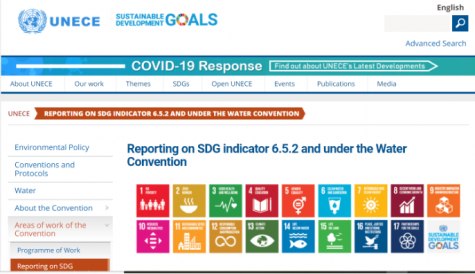
Source:https://unece.org/environmental-policy/water/transboundary_water_cooperation_reporting
For more information, please see the presentation of UNECE. - Approach to public freshwater information - including the availability of disaggregated data
-
Introduction
Public access to water information, with freshwater being one of the essential environmental media, is crucial for good governance to enable participation in water management and in transboundary water cooperation. In order to strengthen democracy, transparency and accountability in the actions of decision makers, an easy access is recognized by many data provider and has found its international agreement in the Arhus Convention which is supporting the public access to environmental information held by public authorities upon request. In addition, public authorities have to actively collect and disseminate certain types of environmental information, this is most often operationalized by electronic water information systems.
Good practices
Bosnia and Herzegovina SDG portal -statistical activities related to SDG
The web-portal is for disseminating global SDG indicator data for Bosnia and Herzegovina. With the support of the United Nations Economic Commission for Europe (UNECE) the site was created and maintained by the Agency for Statistics of Bosnia and Herzegovina.

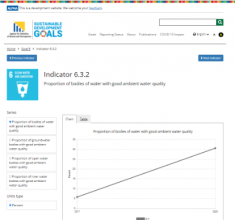
Source: https://sdg.bhas.gov.ba/
Armenia and Georgia
Water Information Systems (WISE) in Georgia and Armenia
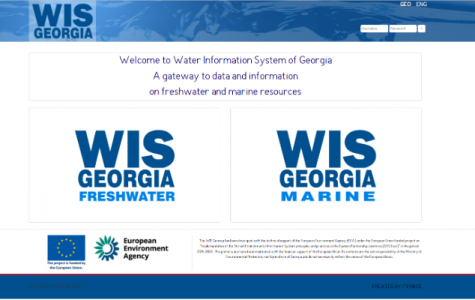
With the help of water quality data from Armenia and Georgia, the concept of WISE for strengthening water data and information management was replicated:
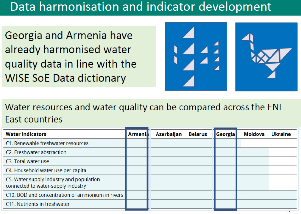
Source: Assessing the EEA cooperation with Western Balkans, ENI East and Central Asia on integrated water management. https://unece.org/sites/default/files/2021-04/2.1%20EEA_UNECE_SEIS_Webinar_2021%2004%2021_v3_0.pdf
WISA - Water Information System Austria
The Water Information System Austria - WISA is the central platform through which access to data and information about the Austrian water industry is to be made possible.
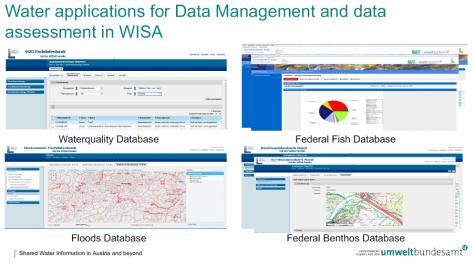
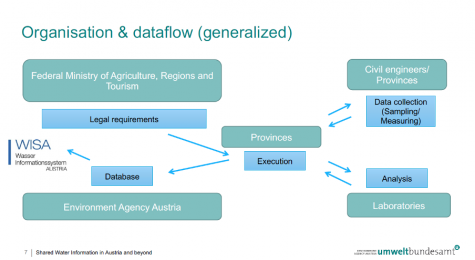
For more information, please see the presentation of Austria, Bosnia and Herzegovina and European Environment Agency.
- Freshwater management efforts
-
Introduction
With the natural water cycle, crossing borders and affecting many water users and natural systems depending on freshwater, a national as well as a transboundary water management needs to be in place. Such a sustainable water management is essential for serving these different needs in order to support human wellbeing and stability for generations to come. Sufficient, most recent, reliable and available data form the base for all good management approaches.
Identified Challenges
Armenia
National Capacities:
- Limited or insufficient harmonization of the national legislation with the EU one
Compliance:
- Compliance with the WFD requirements
- Limited or Insufficient harmonization of the national legislation with the EU one
Bosnia & Herzegovina
- Bosnia and Herzegovina has not yet started to develop a national program for transposing EU NPAA regulations,
- Coordination of the process of transposition, application and implementation of EU legislation in Bosnia and Herzegovina results in incomplete/non-existent information on the adopted acquis Communautaire and the inability to monitor implementation need to be strengthened;
- Develop a Plan of harmonization of domestic regulations in the field of water management with the EU-Acquis-Plan of implementation of other obligations related to water management in the process of accession to the European Union.
- Elaborate a cost plan for the implementation of regulations in the field of water management.
- Establish an efficient administration at the Bosnia and Herzegovina level with strengthened administrative capacity to harmonize and implement the EU-Acquis and other obligations arising from membership in the European Union.
- Fulfillment of international obligations arising from accepted international agreements on environmental protection need further support
Georgia
- Implement the planned Water reform, comprising:
- To draft a Law on Water Resources Management based on EU legislation, River Basin Management, Economic incentives, Surface water abstraction fees and a permit system.
For more information, please see the presentation of Austria, Bosnia and Herzegovina and Georgia.
Good practices
Georgia- SDG 6 IWRM Support Programme in Georgia
Under this support programme a stakeholder consultation under SDG 6.5.1 reporting was conducted and SDG 6.5.1 has recently been nationalized.
Kazakhstan and Kyrgyzstan- The Aspara River Basin
This case study was developed within the project “Stakeholders’ partnerships in collaborative policymaking: Fostering transboundary cooperation on small watersheds in Central Asia” and financed by USAID, in collaboration with the project “Support towards local initiatives in the environmental governance and water resources management in Central Asia” project, funded by the Norwegian Ministry of Climate and Environment.
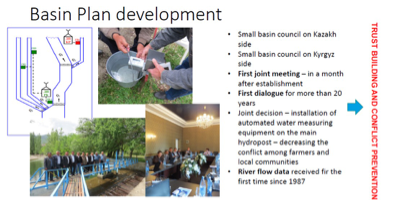
Kyrgyzstan and Tajikistan- Water basin plan for the Isfara River
A cooperation on transboundary rivers in Central Asia has been developed, which was part of the “Strategy for a New Partnership” between the European Union and the countries of Central Asia. This cooperation is open to all Central Asian stakeholders.
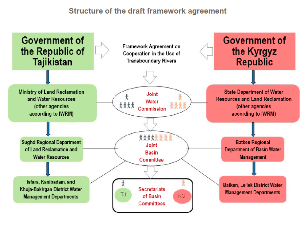
For more information, please see the presentation of Georgia, Deutsche Gesellschaft für Internationale Zusammenarbeit GmbH (GIZ) and USAID Regional Water and Vulnerable Environment Activity.

